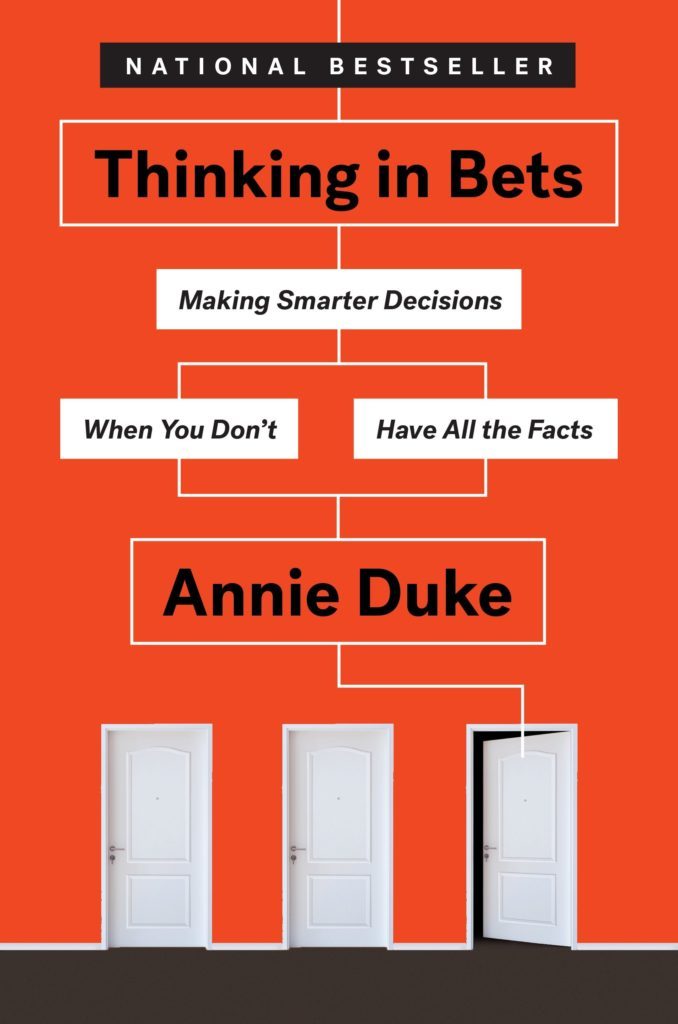In this episode, former World Series of Poker champion and author, Annie Duke, explains how poker is a pertinent model system for decision making in the real world, a system which blends imperfect information with some unknown percentage of both luck and skill. We go through the decision-making matrix, and how we spend most of our energy focusing on just one of the four quadrants at the expense of the learning opportunities that come from the other 75% of situations. Annie also shares how this evaluation of only the bad outcomes (and our tendency to judge others more harshly than ourselves in the face of a non-status quo decision), leads individuals, leaders, and teams to avoid bad outcomes at all costs. This avoidance is at the cost of the types of decisions which lead to progress and innovation both personally, and societally, across many realms from poker to sports to business to medicine. We also dive deep into a framework for learning, and the levels of thought required to rise to the top of a given domain. Finally, we talk about something that resonated deeply with me in terms of how I think about extending healthspan, which is the concept of “backcasting”.
Subscribe on: APPLE PODCASTS | RSS | GOOGLE | OVERCAST | STITCHER
We discuss:
- Annie’s background, favorite sports teams, and Peter’s affinity for Belichick [7:30];
- Chess vs. poker: Which is a better metaphor for decision making in life (and medicine)? [12:30];
- Thinking probabilistically: Why we aren’t wired that way, and how you can improve it for better decision making [18:15];
- Variable reinforcement: The psychological draw of poker that keeps people playing [25:15];
- The role of luck and skill in poker (and other sports), and the difference between looking at the short run vs. long run [38:00];
- A brief explanation of Texas hold ‘em [47:00];
- The added complexity of reading the behavior of others players in poker [53:15];
- Why Annie likes to “quit fast”, and why poker is still popular despite the power of loss aversion [58:30];
- Limit vs. no limit poker, and how the game has changed with growing popularity [1:01:00];
- The advent of analytics to poker, and why Annie would get crushed against today’s professionals [1:10:30];
- The decision matrix, and the ‘resulting’ heuristic: The simplifier we use to judge the quality of decisions —The Pete Carroll Superbowl play call example [1:16:30];
- The personal and societal consequences of avoiding bad outcomes [1:27:00];
- Poker as a model system for life [1:37:15];
- How many leaders are making (and encouraging) status-quo decisions, and how Bill Belichick’s decision making changed after winning two Super Bowls [1:41:00];
- What did we learn about decision making from the Y2K nothingburger? And how about the D-Day invasion? [1:46:30];
- The first step to becoming a good decision maker [1:48:45];
- The difference between elite poker players and the ones who make much slower progress [1:55:30];
- Framework for learning a skill, the four levels of thought, and why we hate digging into our victories to see what happened [1:58:15];
- The capacity for self-deception, and when it is MOST important to apply four-level thinking [2:06:15];
- Soft landings: The challenge of high-level thinking where there is subtle feedback and wider skill gaps [2:16:45];
- The benefits of ‘backcasting’ (and doing pre-mortems) [2:19:30];
- Parting advice from Annie for those feeling overwhelmed (and two book recommendations) [2:28:30]; and
- More.
Get Peter’s expertise in your inbox 100% free.
Sign up to receive An Introductory Guide to Longevity by Peter Attia, weekly longevity-focused articles, and new podcast announcements.
Annie’s background, favorite sports teams, and Peter’s affinity for Belichick [7:30]
- Annie is lives in Philadelphia, but grew up in New England
- Her favorite sports teams are
- Eagles
- Peter, a Bill Belichick fan, is still upset that the Patriots lost to the Eagles in Super Bowl LII
- Annie doesn’t feel bad for Peter
- Red Sox
- Players mentioned:
- Eagles
-
- Celtics
- Players mentioned:
- Celtics
Bill Belichick
- Peter says he’s actually more of a Bill Belichick fan than a Patriots fan
- Would love to have Belichick on the podcast
- Annie says she is going to introduce Peter to Mike Lombardi as a potential podcast guest
- He worked with Bill Belichick and Bill Walsh
- He wrote Gridiron Genius
“Beautiful” article about Bill Belichick: No More Questions
Chess vs. poker: Which is a better metaphor for decision making in life (and medicine)? [12:30]

Figure 1. Cover of Thinking in Bets. Image credit: amazon.com
Thinking in Bets: Making Smarter Decisions When You Don’t Have All the Facts by Annie Duke
- Peter reached out to Annie Duke immediately following finishing her book, Thinking in Bets
- Peter related strongly to the idea of making decisions with incomplete information, something he does all the time in medicine
Chess vs. Poker
- In chess, you are dealing with complete knowledge
- In poker, you have incomplete information
- This makes poker a better metaphor for life
- In life, we are constantly making decisions with incomplete information
⇒ Luck
- In chess, Luck plays no factor in the outcomeIn poker
- In poker: Luck is a bit part of it, and you can only play probabilities, and you could still lose even if you made the right decision
⇒ In medicine:
“Even if you did have complete information, if you apply a treatment in a situation and it happens to work, there’s all sorts of stuff going on, I assume, that’s relatively stochastic that we don’t really understand. Where if we were to do that same thing again, it may not work in the next situation. So we always want to think about that because that has a very big effect on our decision making.”
Why chess just doesn’t work as an analogy to decision making in life:
{end of show notes preview…}
Become a subscriber to access full show notes for every episode: SUBSCRIBE NOW
Would you like access to extensive show notes and references for this podcast (and more)?
Check out this post to see an example of what the substantial show notes look like. Become a member today to get access.

Annie Duke
Annie Duke is an author, and experienced corporate speaker and consultant on the behavior of decision making. In 2018, Annie’s first book for general audiences, “Thinking in Bets: Making Smarter Decisions When You Don’t Have All the Facts” was released by Portfolio, an imprint of Penguin Random House. It quickly became a national bestseller.
As a former professional poker player, she has won more than $4 million in tournament poker. During her career, Annie won a World Series of Poker bracelet, and is the only women to have won the World Series of Poker Tournament of Champions, and the NBC National Poker Heads-Up Championship. Annie is a mom of four who has written five books.
In 2014, Annie co-founded The Alliance for Decision Education to build a national movement that empowers teachers, school administrators and policymakers to bring Decision Education to every Middle and High School student. She also serves on the National Board of After School All Stars and The Franklin Institute, and has won a televised championship in rock-paper-scissors. [annieduke.com]
Twitter: @annieduke



